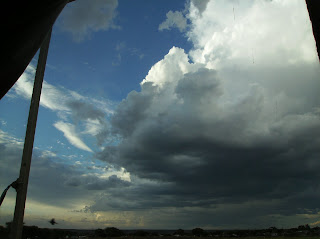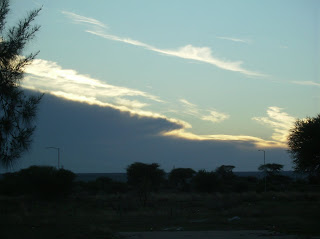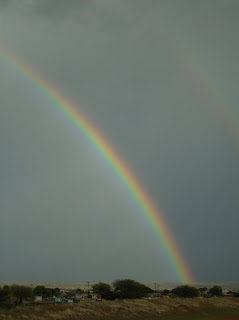







I watched a thunderstorm roll in and roll out last night and captured these pics. I love watching the storms from my window seat; I feel as if I'm in the IMAX theater. I’m posting the pics now, because I think they’re a good metaphor for my post today. The storm clouds of western "civilization" blowing over Africa…
The following is a direct quote from Kuki Gallmann’s, I Dreamed of Africa:
“But now in the times we call modern, like the large herds of animals which once roamed the Highlands, like the forests and the indigenous plants of Africa, these people [native Africans] are endangered because their space and their way of life are disappearing fast and for ever. Since the mission came, with the school and the church, and the shop full of strange things which one needs money to buy, life has changed for the worse for the free pastoral African people. They have been given seeds of alien plants to sow in their virgin forests and of alien beliefs to confuse the innocence of their minds. They wear the discarded garish nylon rags of the white man, which cost money they do not have, rather than the traditional shukas made of animal hides, camouflaged and resistant to the wear-and-tear of bush life, which need not be washed with the chemical soap they cannot afford and which offends their pure streams of clear water.”
I picked up Kuki Gallmann’s memoir at the Vryburg library wondering if I’d read it before. The title seemed familiar. As it turned out, I hadn’t read it before, but had seen the film version starring Kim Bassinger. The book and the film are both passable, if you can stand yet another story of a ridiculously wealthy, white, European woman’s account of moving to Africa to kill a great deal of the wild, large game.
I like this passage and agree with every word of it.
When I began my study of the regional flora/fauna of Kentucky, I loved learning stories of how plants earned their common names. One invasive weed of Kentucky is plantain and its nickname is “white man’s footprint.” The story goes that white European’s brought the seeds of this plant to North America with them from Europe, and the Native Americans at that time named the plant “white man’s footprint” because they knew in seeing these plants that the white men had passed that way.
The danger of any invasive plant to any region is that it usually spreads like wildfire and crowds out native species, making it difficult for any native species to thrive.
I find myself seeing “white man’s footprint” everywhere I turn here in South Africa. Not the plant literally, but certainly evidence of white men’s (European’s) influence in coming here.
Most of this evidence I find disheartening.
From what I understand, most large game of South Africa is no longer running free but is limited to large game reserves and Kruger National Park. This is because the large game was killed in horrific numbers by (white) people coming to Africa to shoot them. Theodore Roosevelt was a big game hunter in Africa and killed a frightening number of animals. As noted in PF Fourie’s, Kruger National Park: Questions and Answers, about the area that eventually became Kruger National Park, “Giraffe, hippo, buffalo, and rhino were extremely rare and elephants occasionally wondered in from Mozambique, but the did not stay” (9). In fact, many of the African animals now residing in Kruger were reintroduced because they had all been but killed out.
As for the African forests, well, I haven’t seen any African forests yet. But as I study the regional flora and fauna of the South Africa of my area, which is of the thornveld savanna, I’m finding that most the plant species I’m seeing, at least the blooming ones, are of a species that have been brought here from somewhere else. Whenever I find a new flower or a new blooming tree, I run to my field guides to identify them and learn they are native to Australia, North or South America, or Europe. When I find a new blooming plant now, instead of becoming excited at its potential African-ness, my first thought is, “Why bother…It is sure to have come from somewhere else and is now crowding out all of the native African flora.”
“Since the missions came…” My, my, how Christianity is flourishing here. I was hoping, and during our pre-service training it was even alluded to, to see African’s practicing a traditional African religion. I have seen no evidence of any African religion in my day-to-day existence so far. All evidence of religion is of the variety (or lack of variety) of the Christian tradition, both Catholic and Protestant, and you can’t walk ten feet without crossing the ground of yet another Christian church.
Africans go to school now because the Europeans came, told them they must leave their work in their homes and traditional ways, to don pants and dress shirts and come sit in a room all day to “learn” of ideals honored and respected by Europeans.
Not that going to school is a bad thing. I have quite a lot to say about the school system in South Africa and frankly, that is why I am here. But for now, let’s just imagine the Europeans did not come to South African and the native peoples were still living with the land and practicing their native traditions. Who is to say OUR way, the western, European way, is the RIGHT way? Weren’t the native South Africans doing just fine without us?
“and the shop full of strange things which one needs money to buy. . . ” The tuck shop. I’m not sure how this institution has earned its name, perhaps from the English who like to “tuck in” to things? Everywhere in the South African villages, you’ll find small, independently owned “tuck shops,” the South African version of a convenience store. Some of the larger ones sell real food and household necessities, but most of them sell cold drinks, candy, and white bread. And guess what? Everyone wants these items but the money to have them is scarce indeed. South Africans’ have been eating a porridge made from corn as their primary starch for generations; what do they want now? White bread and cold, sugary drinks.
“They wear the discarded garish nylon rags of the white man, which cost money they do not have, rather than the traditional shukas made of animal hides, camouflaged and resistant to the wear-and-tear of bush life, which need not be washed with the chemical soap they cannot afford and which offends their pure streams of clear water.”
Haven’t we all seen the full-color photos of wonderful, vibrantly colored garments of traditional African clothing? I must admit, I had hopes of seeing some. I haven’t. Most South Africans, or the ones I see, dress as Americans do, without the casual wear component. This means that if you meet a South African, they are likely to be wearing very nice suits, pants, and dresses with very nice, dressy, shiny shoes. Remember when you used to have to dress nicely to go to church? That’s how South Africans typically dress.
If anyone needs casual wear, in all of this red dust, it’s South Africa. But they won’t have it…
There is a traditional South African dress that you see here. Usually the older women wear them. The fabric they use is a bit drab, and I’ve read that drab fabric was all that was available to black South Africans under the oppressive governments and the drab fabric shows up in their hand-made dresses to this day. They are striking and beautiful in their own way, but are nothing like the colorful clothing of other nations in Africa. I hope to have one or two of these hand-made dresses by the time I come home. I’ll concede to wearing a dress/skirt… If it’s African made!!
“rather than the traditional shukas made of animal hides, camouflaged and resistant to the wear-and-tear of bush life”
I think this is what bugs me the most about the Western influence and is perhaps best illustrated in South African fashion. Their traditional clothing was durable and made sense in living with such a harsh environment. Now, everyone is tiptoeing around in high heels then running home to wash the dust out of the polyester and ironing away the wrinkles to do it all over again tomorrow.
“They have been given seeds of alien plants to sow. . .” I can almost cry in watching South Africans garden. There is no mulching or composting so there is no soil amendment. They simply plant their seeds in the red dirt of Africa and throw in some chemical fertilizer. When the plants push up, the pesticide is applied. Since the soil is not amended, to dig in it is back-breaking work. Eish!
Africans imitating the worst behaviors of Americans...
Isn’t that a horrible thing to say? It is. It’s also a horrible thing to think, but I keep coming to this thought again and again.
In my college days I was something of a budding feminist and even minored in Women’s Studies. I dated this guy who liked to torment me about his notions of professional women in the business world. He would say that professional women in the business world were simply women imitating the worst behaviors of men. It made my blood boil when he would say this, which is, I’m sure, why he said it so often.
I return to this thought in my own, judgmental African version: the native Africans here seem to be imitating the worst behavior of Westeners/Americans. And too, I think of the western/European/American influences as the invasive species to this region and is, and has been, making it difficult for the native species to thrive.
Soon, Karen
“But now in the times we call modern, like the large herds of animals which once roamed the Highlands, like the forests and the indigenous plants of Africa, these people [native Africans] are endangered because their space and their way of life are disappearing fast and for ever. Since the mission came, with the school and the church, and the shop full of strange things which one needs money to buy, life has changed for the worse for the free pastoral African people. They have been given seeds of alien plants to sow in their virgin forests and of alien beliefs to confuse the innocence of their minds. They wear the discarded garish nylon rags of the white man, which cost money they do not have, rather than the traditional shukas made of animal hides, camouflaged and resistant to the wear-and-tear of bush life, which need not be washed with the chemical soap they cannot afford and which offends their pure streams of clear water.”
I picked up Kuki Gallmann’s memoir at the Vryburg library wondering if I’d read it before. The title seemed familiar. As it turned out, I hadn’t read it before, but had seen the film version starring Kim Bassinger. The book and the film are both passable, if you can stand yet another story of a ridiculously wealthy, white, European woman’s account of moving to Africa to kill a great deal of the wild, large game.
I like this passage and agree with every word of it.
When I began my study of the regional flora/fauna of Kentucky, I loved learning stories of how plants earned their common names. One invasive weed of Kentucky is plantain and its nickname is “white man’s footprint.” The story goes that white European’s brought the seeds of this plant to North America with them from Europe, and the Native Americans at that time named the plant “white man’s footprint” because they knew in seeing these plants that the white men had passed that way.
The danger of any invasive plant to any region is that it usually spreads like wildfire and crowds out native species, making it difficult for any native species to thrive.
I find myself seeing “white man’s footprint” everywhere I turn here in South Africa. Not the plant literally, but certainly evidence of white men’s (European’s) influence in coming here.
Most of this evidence I find disheartening.
From what I understand, most large game of South Africa is no longer running free but is limited to large game reserves and Kruger National Park. This is because the large game was killed in horrific numbers by (white) people coming to Africa to shoot them. Theodore Roosevelt was a big game hunter in Africa and killed a frightening number of animals. As noted in PF Fourie’s, Kruger National Park: Questions and Answers, about the area that eventually became Kruger National Park, “Giraffe, hippo, buffalo, and rhino were extremely rare and elephants occasionally wondered in from Mozambique, but the did not stay” (9). In fact, many of the African animals now residing in Kruger were reintroduced because they had all been but killed out.
As for the African forests, well, I haven’t seen any African forests yet. But as I study the regional flora and fauna of the South Africa of my area, which is of the thornveld savanna, I’m finding that most the plant species I’m seeing, at least the blooming ones, are of a species that have been brought here from somewhere else. Whenever I find a new flower or a new blooming tree, I run to my field guides to identify them and learn they are native to Australia, North or South America, or Europe. When I find a new blooming plant now, instead of becoming excited at its potential African-ness, my first thought is, “Why bother…It is sure to have come from somewhere else and is now crowding out all of the native African flora.”
“Since the missions came…” My, my, how Christianity is flourishing here. I was hoping, and during our pre-service training it was even alluded to, to see African’s practicing a traditional African religion. I have seen no evidence of any African religion in my day-to-day existence so far. All evidence of religion is of the variety (or lack of variety) of the Christian tradition, both Catholic and Protestant, and you can’t walk ten feet without crossing the ground of yet another Christian church.
Africans go to school now because the Europeans came, told them they must leave their work in their homes and traditional ways, to don pants and dress shirts and come sit in a room all day to “learn” of ideals honored and respected by Europeans.
Not that going to school is a bad thing. I have quite a lot to say about the school system in South Africa and frankly, that is why I am here. But for now, let’s just imagine the Europeans did not come to South African and the native peoples were still living with the land and practicing their native traditions. Who is to say OUR way, the western, European way, is the RIGHT way? Weren’t the native South Africans doing just fine without us?
“and the shop full of strange things which one needs money to buy. . . ” The tuck shop. I’m not sure how this institution has earned its name, perhaps from the English who like to “tuck in” to things? Everywhere in the South African villages, you’ll find small, independently owned “tuck shops,” the South African version of a convenience store. Some of the larger ones sell real food and household necessities, but most of them sell cold drinks, candy, and white bread. And guess what? Everyone wants these items but the money to have them is scarce indeed. South Africans’ have been eating a porridge made from corn as their primary starch for generations; what do they want now? White bread and cold, sugary drinks.
“They wear the discarded garish nylon rags of the white man, which cost money they do not have, rather than the traditional shukas made of animal hides, camouflaged and resistant to the wear-and-tear of bush life, which need not be washed with the chemical soap they cannot afford and which offends their pure streams of clear water.”
Haven’t we all seen the full-color photos of wonderful, vibrantly colored garments of traditional African clothing? I must admit, I had hopes of seeing some. I haven’t. Most South Africans, or the ones I see, dress as Americans do, without the casual wear component. This means that if you meet a South African, they are likely to be wearing very nice suits, pants, and dresses with very nice, dressy, shiny shoes. Remember when you used to have to dress nicely to go to church? That’s how South Africans typically dress.
If anyone needs casual wear, in all of this red dust, it’s South Africa. But they won’t have it…
There is a traditional South African dress that you see here. Usually the older women wear them. The fabric they use is a bit drab, and I’ve read that drab fabric was all that was available to black South Africans under the oppressive governments and the drab fabric shows up in their hand-made dresses to this day. They are striking and beautiful in their own way, but are nothing like the colorful clothing of other nations in Africa. I hope to have one or two of these hand-made dresses by the time I come home. I’ll concede to wearing a dress/skirt… If it’s African made!!
“rather than the traditional shukas made of animal hides, camouflaged and resistant to the wear-and-tear of bush life”
I think this is what bugs me the most about the Western influence and is perhaps best illustrated in South African fashion. Their traditional clothing was durable and made sense in living with such a harsh environment. Now, everyone is tiptoeing around in high heels then running home to wash the dust out of the polyester and ironing away the wrinkles to do it all over again tomorrow.
“They have been given seeds of alien plants to sow. . .” I can almost cry in watching South Africans garden. There is no mulching or composting so there is no soil amendment. They simply plant their seeds in the red dirt of Africa and throw in some chemical fertilizer. When the plants push up, the pesticide is applied. Since the soil is not amended, to dig in it is back-breaking work. Eish!
Africans imitating the worst behaviors of Americans...
Isn’t that a horrible thing to say? It is. It’s also a horrible thing to think, but I keep coming to this thought again and again.
In my college days I was something of a budding feminist and even minored in Women’s Studies. I dated this guy who liked to torment me about his notions of professional women in the business world. He would say that professional women in the business world were simply women imitating the worst behaviors of men. It made my blood boil when he would say this, which is, I’m sure, why he said it so often.
I return to this thought in my own, judgmental African version: the native Africans here seem to be imitating the worst behavior of Westeners/Americans. And too, I think of the western/European/American influences as the invasive species to this region and is, and has been, making it difficult for the native species to thrive.
Soon, Karen




































